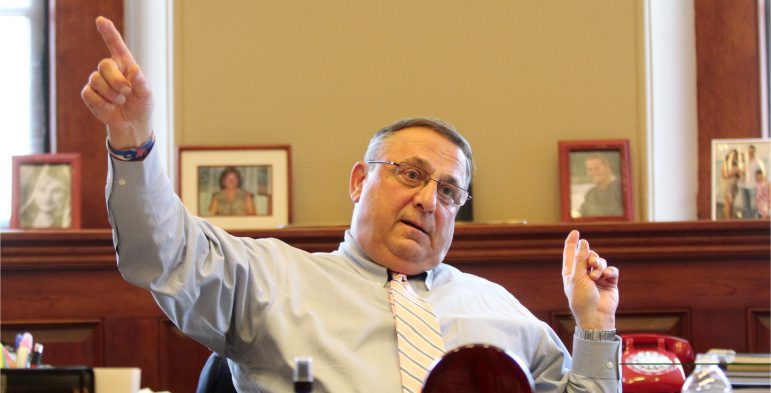The LePage Inaugural 2015 group, which is organizing celebrations to coincide with the official inauguration, is offering a discount to parties of four or more to attend “a thank-you event” for just $2,000 per person.
That’s $1,000 off retail!

The regular price is $3,000 per person to go to the fundraiser that’s part of the festivities surrounding Paul LePage’s gubernatorial inauguration in January.
That’s a discount of 33 percent. How can you afford not to round up a bunch of your best buds or favorite fellow lobbyists and attend?
If LePage’s last inaugural is any indication, there will be lots of Mainers and Maine businesses who either (a) want to party with LePage or (b) see shelling out thousands of dollars to attend the event as a necessary investment in getting up close and personal with the guy who runs state government. Or (c) both of the above.
Inauguration events are the perfect vehicle for those who want to influence state government, said Pete Quist, research director at the National Institute for Money In State Politics. Unlike giving to a candidate, “you know you’re dealing with a winner.” Added benefit to insiders: In Maine, there aren’t limits on contributions, as there are with political candidates and campaigns.
And just because LePage is a Republican doesn’t mean his inaugural events will only attract Republicans. Hobnobbing with the powerful can transcend party politics in Maine, especially at nicey-nicey events like inaugurations.
So last time around, besides prominent Maine corporations L.L. Bean, Cianbro and Wright Express, the list of contributors to the newly elected Republican governor’s 2011 inaugural and transition included the venerable Democratic law firm of Preti Flaherty, home to many of the state’s most prominent lobbyists (although a LePage advisor, Republican lawyer Ann Robinson, worked there as well) and First Wind, whose executive vice president, Kurt Adams, was once chief legal counsel to Gov. John Baldacci and is a prominent Democratic donor.
We know who contributed to the LePage inaugural and transition in 2010-2011 only because LePage made the list public — although he didn’t disclose the amounts they gave. Littlefield said that he expects the current contributor list will be made public as well, “even though we’re not required to do so.”
There is no requirement in Maine law to disclose transition fundraising, nor are there limits on contributions. That makes such appeals an especially enticing way for lobbyists to get their foot in the door without the public knowing about it (unless, like LePage, disclosure is made voluntarily).
Lobbyist Leann Diehl, who is volunteering to help plan the LePage inaugural festivities, sent an invitation to the “thank-you” event to fellow lobbyists.
“I am writing to you — and will be calling you — to invite you and/or your clients to join us in celebrating the re-election of Governor Paul LePage,” wrote Diehl. Diehl has represented clients ranging from Central Maine Power to US Cellular to Maine Yankee Atomic Power.
The lack of disclosure for gubernatorial inauguration fundraising is a problem that needs fixing, said Andrew Bossie, head of Maine Citizens for Clean Elections. Bossie says the secrecy surrounding inaugural fundraising undermines Maine’s relatively rigorous requirements to disclose campaign fundraising.
“Loopholes? This is a big one,” said Bossie, whose group is collecting signatures for a “Clean Elections Initiative” that includes changing Maine law to require reporting of such fundraising.
Bossie’s group’s effort to close the loophole comes after a failed effort in 2013 to do the same. That’s when the Maine Commission on Governmental Ethics and Election Practices submitted a bill, LD 1023, that would require disclosure of fundraising for inaugural events (State Rep. Michael Carey, D-Lewiston, had a similar provision in a bill he submitted that year).
During the bill’s public hearing, Bossie testified that “The public has a strong interest in knowing who is giving money or anything of value to the Governor-elect to pay these expenses and how that money is being used … LD 1023 also requires the Governor-elect to report all individuals who are raising funds for the committee … These ‘solicitors’ are an increasingly common feature of political fundraising, and there is a movement toward greater disclosure of solicitors in many states and at the federal level.”
According to testimony by Jonathan Wayne, executive director of the Maine Commission on Governmental Ethics and Elections Practices, “at least eight states have separate disclosure requirements for funds raised to pay for a transition to office or an inauguration.”
The bill passed but was vetoed by LePage, who said in his veto message that “When the Maine people decide to elect a Governor, they express their confidence in that individual’s integrity and decision-making. Passing laws to immediately question that integrity disrespects the decision made at the ballot box, regardless of the political party of the Governor-elect.”







